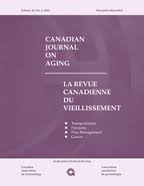Participation in policy discourse: a new form of exclusion for seniors with disabilities?
Recent discourses on aging emphasize the value of older people’s social participation. How participation is defined in policy, however, may not correspond with seniors’ realities. This article reports on the results of a critical discourse analysis conducted on aging policy in Quebec between 2005 and 2011. Results indicate that participation definitions can be problematic recommendations, standards, and expectations. Over time, participation increasingly came to be defined as productivity. The participation context also changed from collective responsibility to community adjustment and personal choice. Finally, policy texts reflected a polarization between activity and a loss of autonomy that linked participation with health status. Results suggest that, although innovative in the Canadian context, articulation of participation in Quebec’s recent policies on aging lacks the politics from which to discuss difference, otherness, and access to participative opportunities. The case of older people’s aging with disabilities illustrates the challenges of the new participatory agenda.

